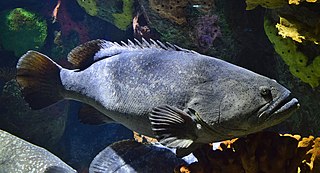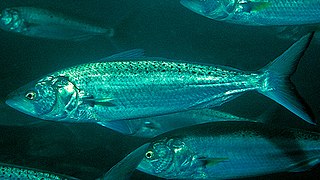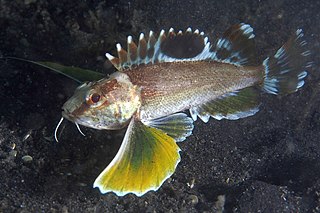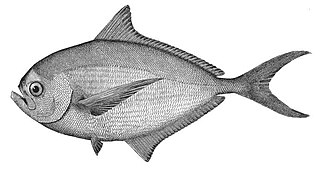
The haddock is a saltwater ray-finned fish from the family Gadidae, the true cods. It is the only species in the monotypic genus Melanogrammus. It is found in the North Atlantic Ocean and associated seas, where it is an important species for fisheries, especially in northern Europe, where it is marketed fresh, frozen and smoked; smoked varieties include the Finnan haddie and the Arbroath smokie. Other smoked versions include long boneless, the fileted side of larger haddock smoked in oak chips with the skin left on the fillet.

The cookiecutter shark, also called the cigar shark, is a species of small squaliform shark in the family Dalatiidae. This shark lives in warm, oceanic waters worldwide, particularly near islands, and has been recorded as deep as 3.7 km (2.3 mi). It migrates vertically up to 3 km (1.9 mi) every day, approaching the surface at dusk and descending with the dawn. Reaching only 42–56 cm (16.5–22 in) in length, the cookiecutter shark has a long, cylindrical body with a short, blunt snout, large eyes, two tiny spineless dorsal fins, and a large caudal fin. It is dark brown, with light-emitting photophores covering its underside except for a dark "collar" around its throat and gill slits.

Monodactylidae is a family of perciform bony fish commonly referred to as monos, moonyfishes or fingerfishes. All are strongly laterally compressed with disc-shaped bodies and tall anal and dorsal fins. Unusually for fish, scales occur on their dorsal fins and sometimes on the anal fins. The pelvic fins are small, sometimes vestigial. They are of moderate size, typically around 25 centimetres (9.8 in) in length, and Monodactylus sebae can be taller than it is long, measuring up to 30 centimetres (12 in) from the tip of the dorsal fin down to the tip of the anal fin. These long, scaly fins have given them the name "fingerfishes". Most are silvery with yellow and black markings; the juveniles are especially attractive, and most species are popular as aquarium fish.

The giant grouper (Epinephelus lanceolatus), also known as the Queensland groper (grouper), brindle grouper or mottled-brown sea bass, is a species of marine ray-finned fish, a grouper from the subfamily Epinephelinae which is part of the family Serranidae, which also includes the anthias and sea basses. It has a wide Indo-Pacific distribution and is one of the largest extant species of bony fish.

The sharpnose sevengill shark, also known as one-finned shark, perlon shark, sevengill cow shark, sharpsnouted sevengill or slender sevengill, is a species of shark in the family Hexanchidae, and the only living species in the genus Heptranchias. Found almost circumglobally in deep water, it is one of the few species of sharks with seven pairs of gill slits as opposed to the usual five. The other shark species with seven gill slits is the broadnose sevengill shark. Though small, this shark is an active, voracious predator of invertebrates and fish. When caught, this species is notably defensive and will attempt to bite. It is of minor commercial importance.

The Atlantic pomfret, also known as Ray's bream, is a species of marine ray-finned fish, a pomfret of the family Bramidae. It is found in the Atlantic, Indian, and South Pacific Oceans, at depths down to 1,000 m (3,300 ft).

The big-scale pomfret also known as the long-finned bream, is a species of marine ray-finned fish, a pomfret of the family Bramidae. It is found in the Atlantic ocean, at depths down to 500 metres (1,600 ft). This species reaches a length of up to 100 centimetres (39 in) SL. This species is of minor importance to the commercial fisheries industry. From Ireland there are only two records of this fish. The last being from Co. Wicklow.

The brownspotted grouper, also known as the brown spotted reef cod, brown-spotted rockcod, coral grouper or honeycomb cod, is a species of marine ray-finned fish, a grouper from the subfamily Epinephelinae which is part of the family Serranidae, which also includes the anthias and sea basses. It has an Indo-Pacific distribution but in the northern Indian Ocean this distribution is discontinuous. It forms part of a species complex with two closely related species in the genus Epinephelus.

Arripis trutta, known as the Australian salmon in Australia and as kahawai in New Zealand, is a South Pacific marine fish and one of the four extant species within the genus Arripis, native to the cooler waters around the southeastern Australian coasts and the New Zealand coastline. Other common names for this species include Eastern Australian salmon, bay trout, blackback salmon, buck salmon, cocky salmon, colonial salmon, newfish and salmon trout.

The blacktip grouper, also known as the redbanded grouper, blacktipped cod, black-tipped rockcod, footballer cod, red-barred cod, red-barred rockcod, scarlet rock-cod or weathered rock-cod, is a species of marine ray-finned fish, a grouper from the subfamily Epinephelinae which is part of the family Serranidae, which also includes the anthias and sea basses. It is found in the tropical Indo-Pacific region. It is the type species of the genus Epinephelus.

The orange-spotted grouper, also known as the brown-spotted rockcod, estuary cod, estuary rockcod, goldspotted rockcod, greasy cod, North-west groper, orange spotted cod or blue-and-yellow grouper, is a species of marine ray-finned fish, a grouper from the subfamily Epinephelinae which is part of the family Serranidae, which also includes the anthias and sea basses. It has an Indo-Pacific distribution and is found in marine and brackish waters.

The potato grouper, also called the potato cod or potato bass, is a species of marine ray-finned fish, a grouper from the subfamily Epinephelinae which is part of the family Serranidae, which also includes the anthias and sea basses. It has a wide Indo-Pacific distribution.

Epinephelus spilotoceps, the foursaddle grouper or spotty cod, is a species of marine ray-finned fish, a grouper from the subfamily Epinephelinae which is part of the family Serranidae, which also includes the anthias and sea basses. It is found in the Indo-Pacific region.

Apistus is a monotypic genus of marine ray-finned fish belonging to the subfamily Apistinae, the wasp scorpionfishes, part of the family Scorpaenidae, the scorpionfishes and their relatives. Its only species is the Apistus carinatus which has the common names ocellated waspfish, bearded waspfish, longfin waspfish or ringtailed cardinalfish, has a wide Indo-Pacific distribution. This species has venom bearing spines in its fins.

Brama is a genus of marine ray-finned fishes from the family Bramidae, the pomfrets. Currently, there are 8 species within the genus.

Pterycombus is a genus of pomfret distinguished by greatly elongated dorsal and anal fins. Along with the genus Pteraclis, these fishes are commonly referred to as fanfishes. Pterycombus can be distinguished from Pteraclis by examining the dorsal and anal fin rays, which should be relatively uniform in thickness to neighboring rays and by a lack of scales anterior to the dorsal fin.
Schuettea is a genus of moonyfishes native to Australia.

Brama australis, the southern rays bream or southern ray's bream is a species of marine ray-finned fish from the family Bramidae, the pomfrets. It is found circumglobally in the southern seas between 34°S and 48°S.

Brama dussumieri, the lesser bream or lowfin pomfret, is a species of marine ray-finned fish, a pomfret of the family Bramidae. It is found in warm seas around the world.

The black pomfret is a species of carangid native to reefs of the Indian Ocean and western Pacific Ocean. This species is very important to local fisheries and is the only known member of its genus.



















